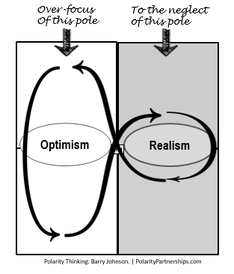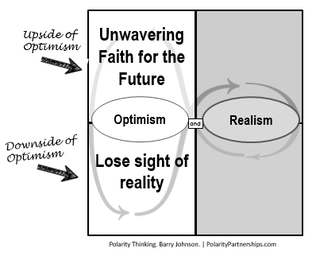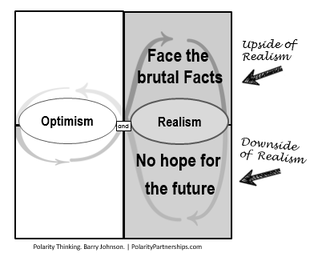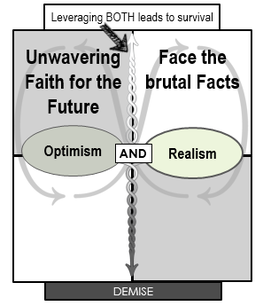 As a society, we value and admire optimists. Those of us who are optimists take pride in seeing “the glass half full” in light of challenges. However it’s not that simple! This month’s CBODN Book Club discussion was on the book “Positively Resilient” by Doug Hensch. We talked about the factors that contribute to one’s ability to “bounce back” from challenging times—and the benefits of overcoming adversity. The discussion got me thinking about the power of positive thinking in the workplace and at home. It also got me thinking about the downside of extreme positivity. As a coach, I know that clients who are overly optimistic may have certain blind spots. In fact, pessimists are known to form more accurate self-assessments than optimists. I wanted to share my thinking on resiliency—which I believe encompasses a healthy dose of both realism and optimism—through a polarity lens. Admiral Jim Stockdale was a Prisoner of War (POW) in Vietnam for seven years. During an interview he was asked, “Who didn’t make it out?” Stockdale responded, “Oh, that’s easy, the optimists.” Polarities at Play: The Stockdale Paradox The story of Admiral Stockdale was made famous by Jim Collins’ book, “Good to Great.” It is the most powerful example I have found that demonstrates the potential downside to being too optimistic. However, the way the story was portrayed seems to imply that you shouldn’t be optimistic. In my opinion, however, the moral of the story is that one needs to access both a realistic and optimistic mindset without over-focusing on either side. In retelling this story, I would like to examine it from a Polarity lens and build the case for a “both/and” approach. Polarity Thinking, coined by Dr. Barry Johnson of Polarity Partnerships, offers a more dynamic view in which the two "poles" (optimistic and realistic) are interdependent upon one another. In this story when the prisoners' of war learn to leverage the upsides of both poles, they survive.  A Polarity Lens At first, Stockdale’s observation may seem absurd! How could optimism lead to someone’s death? However, when looking through the lens of Polarities, we see the larger dynamic at play. When navigating through complexities, there are at least two interdependent poles at play. The two poles, in this scenario are Optimism and Realism. We will see how these poles depend upon one another. As the story suggests, the prisoners who didn’t survive the war camp over-focused on their optimistic mindset to the neglect of the realities of the situation.  The optimists had an “unwavering belief for the future” that they would be rescued before Christmas. But then, Christmas would come and go, year after year, with no rescue in sight. Over-time, the people who over-focused on this optimistic mindset (to the neglect of Realism), ended up losing all sense of reality.  Meanwhile, there were some soldiers who were able to face “the brutal facts” which gave them a healthy dose of reality. But those who over-focused on the harsh realities (to the neglect of optimism) would find themselves quickly in the downside of Realism. And, over time, the soldiers would lose all hope for the future.  Those who did survive had a mindset that leveraged the upsides of both poles: Optimism AND Realism. As Stockdale commented, “You must never confuse faith that you will prevail in the end—which you can never afford to lose—with the discipline to confront the most brutal facts of your current reality, whatever they might be.” Without the ability to hold BOTH Optimism and Realism, one could not survive the terrible conditions of the prisoner of war camp. Admittedly, this is an extreme life-and-death example. But it’s no exaggeration of the power of polarities and dynamic thinking. Polarities are ever-present and can help you navigate through any complex challenge in the workplace or at home. Application
This polarity of being realistic AND optimistic is very present for me at work and at home. I am constantly thinking of ways to acknowledge the realities of a situation, validate other’s concerns AND offer support to help them navigate through the difficult situations. I’m curious to hear how you have helped others face reality while being encouraging at the same time. Send us your stories and examples, we’d love to hear them.
3 Comments
Anne M. Suh
4/5/2018 04:47:04 pm
I love how you explained the balancing act required to fully take advantage of the benefits of optimism without all of its risks.
Reply
Laura Mendelow
4/6/2018 01:06:26 pm
Thanks Anne. I'm glad you find it helpful. As we all know, easier said then done, right?
Reply
Tina
5/22/2018 11:14:32 am
Hi Laura!
Reply
Your comment will be posted after it is approved.
Leave a Reply. |
AuthorLaura Mendelow |
|
|
©2020. All Rights Reserved. Mendelow Consulting Group, LLC.

